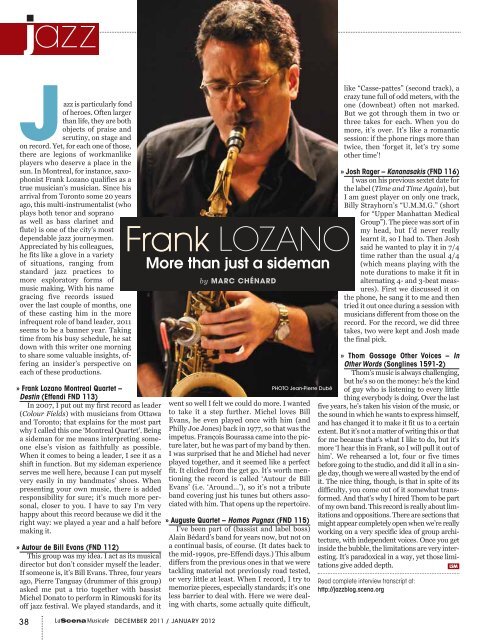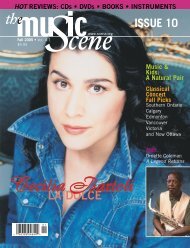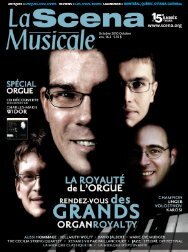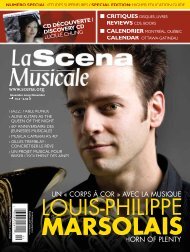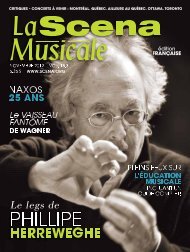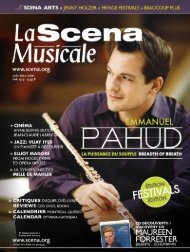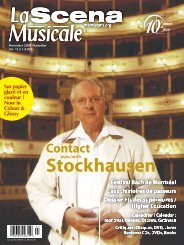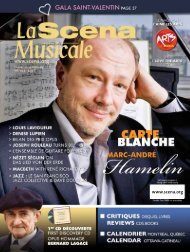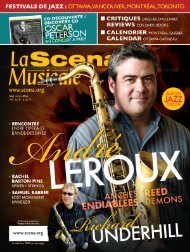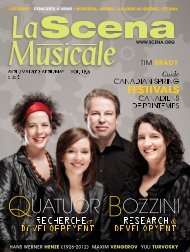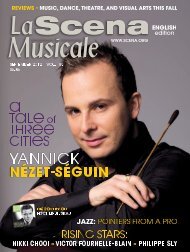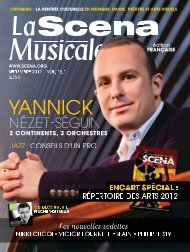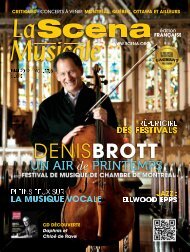Create successful ePaper yourself
Turn your PDF publications into a flip-book with our unique Google optimized e-Paper software.
jazz<br />
Jazz is particularly fond<br />
of heroes. Often larger<br />
than life, they are both<br />
objects of praise and<br />
scrutiny, on stage and<br />
on record. Yet, for each one of those,<br />
there are legions of workmanlike<br />
players who deserve a place in the<br />
sun. In Montreal, for instance, saxophonist<br />
Frank Lozano qualifies as a<br />
true musician’s musician. Since his<br />
arrival from Toronto some 20 years<br />
ago, this multi-instrumentalist (who<br />
plays both tenor and soprano<br />
as well as bass clarinet and<br />
flute) is one of the city’s most<br />
dependable jazz journeymen.<br />
Appreciated by his colleagues,<br />
he fits like a glove in a variety<br />
of situations, ranging from<br />
standard jazz practices to<br />
more exploratory forms of<br />
music making. With his name<br />
gracing five records issued<br />
over the last couple of months, one<br />
of these casting him in the more<br />
infrequent role of band leader, 2011<br />
seems to be a banner year. Taking<br />
time from his busy schedule, he sat<br />
down with this writer one morning<br />
to share some valuable insights, offering<br />
an insider’s perspective on<br />
each of these productions.<br />
» Frank Lozano Montreal Quartet –<br />
Destin (Effendi FND 113)<br />
In 2007, I put out my first record as leader<br />
(Colour Fields) with musicians from Ottawa<br />
and Toronto; that explains for the most part<br />
why I called this one ‘Montreal Quartet’. Being<br />
a sideman for me means interpreting someone<br />
else’s vision as faithfully as possible.<br />
When it comes to being a leader, I see it as a<br />
shift in function. But my sideman experience<br />
serves me well here, because I can put myself<br />
very easily in my bandmates’ shoes. When<br />
presenting your own music, there is added<br />
responsibility for sure; it’s much more personal,<br />
closer to you. I have to say I’m very<br />
happy about this record because we did it the<br />
right way: we played a year and a half before<br />
making it.<br />
» Autour de Bill Evans (FND 112)<br />
This group was my idea. I act as its musical<br />
director but don’t consider myself the leader.<br />
If someone is, it’s Bill Evans. Three, four years<br />
ago, Pierre Tanguay (drummer of this group)<br />
asked me put a trio together with bassist<br />
Michel Donato to perform in Rimouski for its<br />
off jazz festival. We played standards, and it<br />
Frank LOZANO<br />
More than just a sideman<br />
by MARC CHÉNARD<br />
PHOTO Jean-Pierre Dubé<br />
went so well I felt we could do more. I wanted<br />
to take it a step further. Michel loves Bill<br />
Evans, he even played once with him (and<br />
Philly Joe Jones) back in 1977, so that was the<br />
impetus. François Bourassa came into the picture<br />
later, but he was part of my band by then.<br />
I was surprised that he and Michel had never<br />
played together, and it seemed like a perfect<br />
fit. It clicked from the get go. It’s worth mentioning<br />
the record is called ‘Autour de Bill<br />
Evans’ (i.e. ‘Around…’), so it’s not a tribute<br />
band covering just his tunes but others associated<br />
with him. That opens up the repertoire.<br />
» Auguste Quartet – Homos Pugnax (FND 115)<br />
I’ve been part of (bassist and label boss)<br />
Alain Bédard’s band for years now, but not on<br />
a continual basis, of course. (It dates back to<br />
the mid-1990s, pre-Effendi days.) This album<br />
differs from the previous ones in that we were<br />
tackling material not previously road tested,<br />
or very little at least. When I record, I try to<br />
memorize pieces, especially standards; it’s one<br />
less barrier to deal with. Here we were dealing<br />
with charts, some actually quite difficult,<br />
like “Casse-pattes” (second track), a<br />
crazy tune full of odd meters, with the<br />
one (downbeat) often not marked.<br />
But we got through them in two or<br />
three takes for each. When you do<br />
more, it’s over. It’s like a romantic<br />
session: if the phone rings more than<br />
twice, then ‘forget it, let’s try some<br />
other time’!<br />
» Josh Rager – Kananasakis (FND 116)<br />
I was on his previous sextet date for<br />
the label (Time and Time Again), but<br />
I am guest player on only one track,<br />
Billy Strayhorn’s “U.M.M.G.” (short<br />
for “Upper Manhattan Medical<br />
Group”). The piece was sort of in<br />
my head, but I’d never really<br />
learnt it, so I had to. Then Josh<br />
said he wanted to play it in 7/4<br />
time rather than the usual 4/4<br />
(which means playing with the<br />
note durations to make it fit in<br />
alternating 4- and 3-beat measures).<br />
First we discussed it on<br />
the phone, he sang it to me and then<br />
tried it out once during a session with<br />
musicians different from those on the<br />
record. For the record, we did three<br />
takes, two were kept and Josh made<br />
the final pick.<br />
» Thom Gossage Other Voices – In<br />
Other Words (Songlines 1591-2)<br />
Thom’s music is always challenging,<br />
but he’s so on the money: he’s the kind<br />
of guy who is listening to every little<br />
thing everybody is doing. Over the last<br />
five years, he’s taken his vision of the music, or<br />
the sound in which he wants to express himself,<br />
and has changed it to make it fit us to a certain<br />
extent. But it’s not a matter of writing this or that<br />
for me because that’s what I like to do, but it’s<br />
more ‘I hear this in Frank, so I will pull it out of<br />
him’. We rehearsed a lot, four or five times<br />
before going to the studio, and did it all in a single<br />
day, though we were all wasted by the end of<br />
it. The nice thing, though, is that in spite of its<br />
difficulty, you come out of it somewhat transformed.<br />
And that’s why I hired Thom to be part<br />
of my own band. This record is really about limitations<br />
and oppositions. There are sections that<br />
might appear completely open when we’re really<br />
working on a very specific idea of group architecture,<br />
with independent voices. Once you get<br />
inside the bubble, the limitations are very interesting.<br />
It’s paradoxical in a way, yet those limitations<br />
give added depth.<br />
Read complete interview transcript at:<br />
http://jazzblog.scena.org<br />
LSM<br />
38<br />
DECEMBER 2011 / JANUARY 2012


